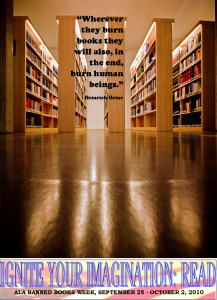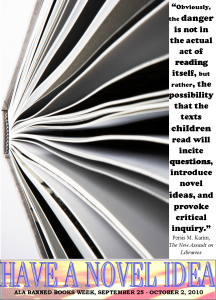Sorry for the muzak reference. Bad Seventies Things have taken over my head today. (I guess I should a.) look up what the real song is, b.) who sings it, c.) and thus get it stuck in my head for life? No. Just remembering my mother’s flirtation with Easy Listening when I was a kid is bad enough, thanks.)

I recently passed along a piece from the blog Write For Your Life to my writing group. The piece on “morning pages” was based on the book The Artist’s Way by Julia Cameron, and according to this piece, morning pages are “three pages of stream of consciousness writing that you do every morning. The intention is to clear your mind of all the annoying claptrap that buzzes around, getting in the way of your creativity.”
Right.
So, I asked my writing group — three of whom are published writers, one a journalist, one an award-winning short story writer — what they thought of that. I asked if they used morning pages, or something like that, to clear away their cobwebs before they set in to writing.
The response? A wincing, “every single day?!”, a disbelieving, “why would I do that?!,” a rather polite “sounds like an interesting idea,” and my favorite response, hysterical laughter.
Um, yeah.
I have to say I love it when my writing group is in sync with me.
We bounced the idea around of freewriting and what it does for us, but none of us could face the idea of doing three pages of writing like that, every single regimented day. The idea – even for the promised goal of improving ourselves – felt confining and a lot like the crappy busywork we got assigned in the fourth grade when our teacher had a headache.

I have a hard time with regimentation of any kind. I force myself to the gym a minimum of three days a week. I have to remind myself to brush my teeth. I sometimes remind myself that at least things like deodorant and putting on something beneath a t-shirt ::cough:: are automatic now, but boy — I really remember fifth grade when my mother despaired of me. I just can’t seem to get into a groove very easily. At least, not doing things that are supposed to be routine; I often can’t even be bothered to eat lunch until 3:30 or so.
Sadly, I tend to run up against this same feeling of put-upon confinement when I encounter …well, any writing advice. When I graduated from college, my favorite professor gave me a copy of a book called, If You Want to Write, by Brenda Ueland. In it, I read that she subscribes to the theory of moodling along, coddling creativity by happily doing nothing in particular. Okay, I can agree with that. Unfortunately, she advocated doing that “moodling” by taking several long walks a day.
Hm.
I like walking all right, but I don’t think it makes me more creative. Walking usually makes me hot, unless it’s nice and windy out, and then I enjoy the sensation of being all sweaty with a cold face. (It’s actually quite nice, and we get 70 mph gales here – that’s actually a lot of fun to walk in, and yes I know I’m weird. Hush up.) If I took several long walks a day, I fear I would never finish anything much – including simple things like laundry and making meals. While I’m find living on toast and wearing wrinkled sweats, I’m not sure how successful a writer that would make me, not really.
The proof should be in the doing, yes? I mean, I manage to write because I enjoy sitting down and writing. And when I don’t enjoy it, I frown a lot and mutter, and do it anyway — because I know I’m just at a spot where things aren’t working, and if I backtrack a half a chapter or so and change a few things, usually things turn out all right.

Would that kind of insight be easier with a walk? Or morning pages?
I don’t know. The reason I bring this up is that I’m planning on re-reading all the writing books I have. If they don’t actually contain any helpful information — avast — to the library they shall go. Maybe someone else will be able to get something out of them.
(Why is it that people give writers books on writing advice? Besides the Ueland, I have Bird by Bird, a few more text-book-y types, and a bunch of Annie Dillard, too.) It’s time to make some space on my shelves – past time, with another Cybils coming up – and so I am doing An Almighty Weeding.
But, tell me about you: what do you do with your early morning hours? What writing books have you found useful? What daily practices – if any – make sense to you and inform your writing? Where did you donate all of your unwanted writing books??








